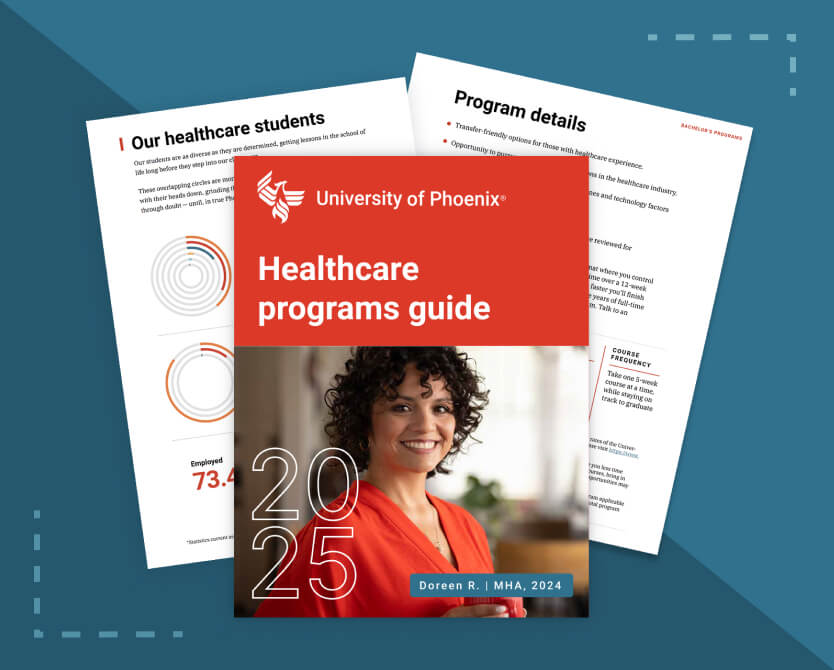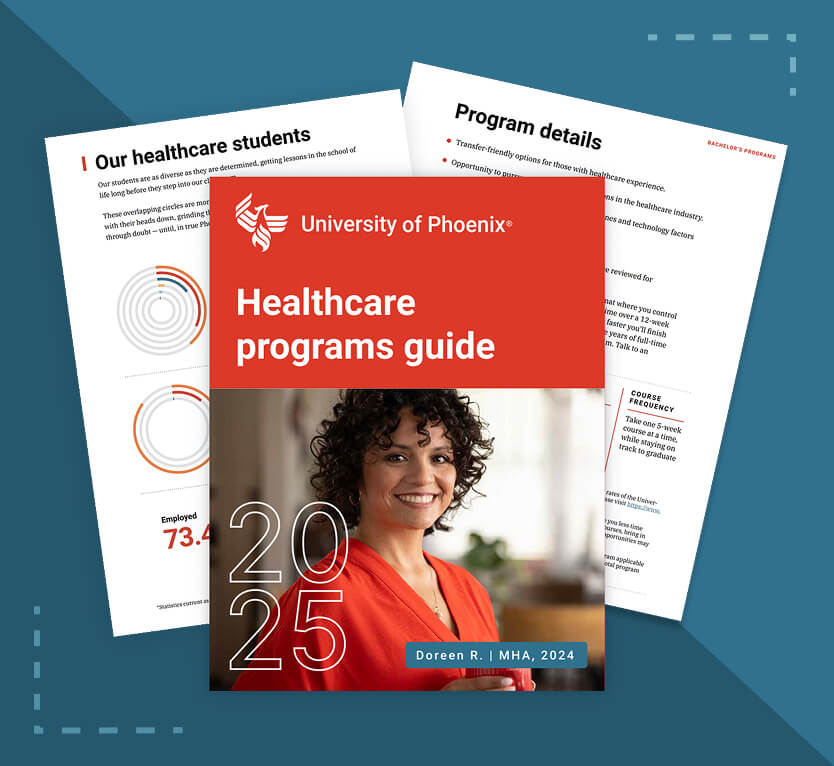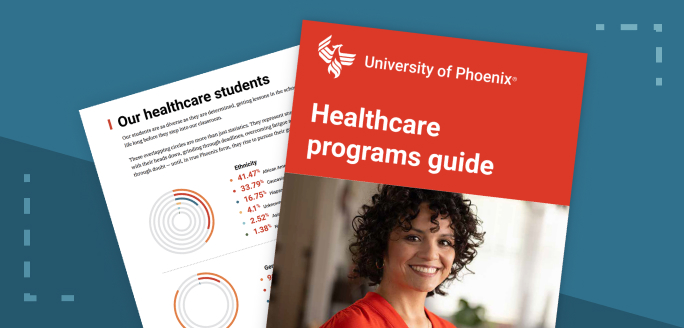Articles > Healthcare > Careers in health information management
Careers in health information management
This article was updated on February 24, 2024.

Written by Michael Feder

Reviewed by Kathryn Uhles, MIS, MSP, Dean, College of Business and IT

Whether a patient is seeking emergency or routine medical care, keeping track of information related to that care is crucial. And it’s not just about keeping names straight. Data on everything from medical histories to test results can provide insights on prognoses, treatment options and emerging health conditions.
What is health information?
Data related to patient healthcare is generally called health information. In the years preceding digitization, hospitals and clinics mainly kept such information as hard copies of patient records, typically on paper. Healthcare providers usually stored the data in filing cabinets. When another physician requested the information, they sent it physically through the mail, making the sharing of patient data a time-consuming process that relied on multiple steps and people to complete.
Today, health providers store such information as electronic health records (EHR), allowing for greater portability for patients and physicians. However, when EHR replaced cumbersome document storage, it resulted in additional tasks and management issues that providers must overcome.
Storing, processing and sharing health information efficiently and securely led to the eventual development of health information management (HIM) as a discipline.
Here are some goals of HIM:
- Attain patient information in a consensual, efficient manner.
- Secure that information from potential theft or alteration.
- Make electronic health records available to authorized patients and doctors.
- Use that health information to make informed decisions about patient healthcare.
- Perform this work within regulatory requirements, such as the Health Insurance Portability and Accountability Act (HIPAA).
What is health information management?
Health information management is a broad field that deals with how medical professionals and healthcare settings handle patients’ digital and traditional medical information. those who pursue careers in health information management can work in many different settings and have a lot of unique jobs.
The American Health Information Management Association provides a more specific definition of health information management:
“Health information management (HIM) is the practice of acquiring, analyzing and protecting digital and traditional medical information vital to providing quality patient care. It is a combination of business, science and information technology.”
Today, most medical information is handled digitally with the benefit of the internet, server power and information technology support.
Why pursue careers in health information management?
HIM contains aspects of a wide variety of disciplines. It can be a compelling career choice for someone looking to work in the medical space and technology but without the pressure of direct patient care.
For those with a business mindset, careers in health information management can help organizations (particularly healthcare-associated ones) make better business decisions. Take, for example, an insurance company looking to optimize its health insurance plans. The HIM professional it hires may be tasked with analyzing thousands of anonymized patient records for potential health trends. That data allows the company to adjust its insurance packages to align with current trends. This can ultimately make the company more profitable.
It’s not just about the numbers, however. It’s no exaggeration that HIM can help save lives. Through coordinated data collection and analysis, HIM professionals lay the groundwork for safe medical trials, for monitoring disease outbreaks and more. This work would not be nearly as efficient without the data collection and processing methods developed in the health information management discipline.
Where do HIM professionals work?
Healthcare organizations must handle patient health information within the boundaries of government regulations, and, in many ways, they rely on HIM professionals to ensure this is accomplished.
That’s just the tip of the iceberg, though, when it comes to the kind of work HIM professionals can find.
According to the U.S. Bureau of Labor Statistics (BLS), most those with careers in health information management work in general medical and surgical hospitals.
HIM professionals can also find work in doctors’ offices, with educational services and with the federal government.
Health information management roles and responsibilities might include:
- Managing and ensuring the accuracy of patient records
- Updating clinical databases with health information
- Organizing and classifying information for insurance and data analysis purposes
- Ensuring patient records are kept confidentially and according to regulatory guidelines
Careers in health information management
The following are a few common career paths in health information management. All information related to the following positions is sourced from BLS.
Salary ranges are not specific to students or graduates of University of Phoenix. Actual outcomes vary based on multiple factors, including prior work experience, geographic location and other factors specific to the individual. University of Phoenix does not guarantee employment, salary level or career advancement. BLS data is geographically based. Information for a specific state/city can be researched on the BLS website.
BLS Occupational Employment Projections, 2022-2032 is published by the U.S. Bureau of Labor Statistics. This data reflects BLS’ projections of national (not local) conditions. These data points are not specific to University of Phoenix students or graduates.
Office manager
Overview: In healthcare settings, office managers organize and coordinate administrative functions. That includes supervising staff, setting goals and deadlines, ensuring compliance with HIPAA and making sure facilities meet specific health and security standards.
National salary range: As May 2023, administrative services managers earned between $62,470 and $188,820, with a median wage $106,470, according to BLS.
Education requirements: Most administrative services managers need a bachelor’s degree, often in a business-related field. For healthcare settings, a bachelor’s in health management can suffice.
Job outlook: Between 2022 and 2032, BLS estimates a 5% projected growth in the number of administrative services and facilities managers, which include office managers.
Practice manager
Overview: Practice managers share similar responsibilities with office managers, but some of their work broadens that scope. They’re typically in charge of healthcare-specific tasks, for example, including compliance with healthcare laws and regulations, coordinating medical staff, overseeing billing and coding, and managing patient records.
National salary range: As May 2023, medical and health services managers (including practice managers) earned between $67,900 and $216,750, with a median of $110,680, according to BLS.
Education requirements: Most practice managers typically need a bachelor’s degree, although in some cases an associate degree will work.
Job outlook: Between 2022 and 2032, BLS projects 28% growth in the number of medical and health services managers, which is much faster than the average for all occupations.
Health manager
Overview: Health managers, also known as healthcare administrators or health services managers, are responsible for planning, directing and coordinating health and medical services. They might manage an entire facility, a specific clinical area or department, or a medical practice for a group of physicians.
National salary range: As May 2023, medical and health services managers earned between $67,900 and $216,750, with a median of $110,680, according to BLS.
Education requirements: Health managers typically have a bachelor’s degree, although as they progress to executive leadership roles, advanced graduate degrees might be preferable.
Job outlook: Much like practice managers, health managers’ job outlook is positive. They are included in the subset of managers that is projected by BLS to see 28% growth over the next decade.
How to prepare for careers in health information management
According to BLS, a high school diploma or equivalent may be enough to enter into a career in HIM. There may be employers who seek out applicants with postsecondary education in a related field of study, such as an online health management degree.
This type of degree should cover many of the baseline skills and knowledge necessary to pursue a career in HIM. These might include the regulations governing how patient health information is processed and stored and regulatory guidelines that impact the healthcare industry. Pursuing this degree is also a way to acclimate to the technology relevant to a career in HIM.
A health management degree also typically addresses the medical terminology and classification systems that are standard in the field. For candidates interested in a career in HIM but are intimidated by the technical details of medicine, pursuing a degree can help fill in those gaps. Some companies or job roles that handle patient health information require specific industry certifications beyond a degree.
This background covers the technical, medical and legal knowledge essential to an HIM career. Pursuing education beyond a bachelor’s degree can help students prepare for more specialized positions, such as a medical or health services manager. A master’s in health administration with a concentration in health informatics, for example, prepares students for the intricacies of managing clinical information and patient records.
Education for careers in health information management
Whether you’re seeking a career change or want to advance your skills in health information management, University of Phoenix offers flexible, online degree and certificate programs to help build skills that next-generation careers in health information management require:
- Online healthcare certificate programs
- Bachelor of Science in Health Administration
- Bachelor of Science in Health Management
- Master of Health Administration with a concentration in Health Care Compliance and Privacy
Contact University of Phoenix for more information.

ABOUT THE AUTHOR
A graduate of Johns Hopkins University and its Writing Seminars program and winner of the Stephen A. Dixon Literary Prize, Michael Feder brings an eye for detail and a passion for research to every article he writes. His academic and professional background includes experience in marketing, content development, script writing and SEO. Today, he works as a multimedia specialist at University of Phoenix where he covers a variety of topics ranging from healthcare to IT.

ABOUT THE REVIEWER
Mark Jóhannsson is the Dean of the College of Health Professions. He has a career spanning over 35 years of healthcare management, public health practice, higher education administration, teaching and clinical/behavioral research within corporate, community and academic settings. He has served as both an educational and keynote speaker, and he has been published in a variety of peer-reviewed and periodic literature.
This article has been vetted by University of Phoenix's editorial advisory committee.
Read more about our editorial process.




Get your free Healthcare programs guide
Explore our healthcare degrees and certificates - 100% of our programs are aligned to career-relevant skills.
You’re making moves!
This guide is loaded with answers. Download it now or get it from your inbox. Questions? We’re just a call or click away.
Get your free healthcare programs guide. Please enter your first and last name.
You’re making moves!
This guide is loaded with answers. Download it now or get it from your inbox. Questions? We’re just a call or click away.


